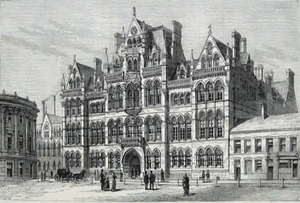Arthur Lapworth facts for kids
Arthur Lapworth (born October 10, 1872 – died April 5, 1941) was an important Scottish chemist. He made big discoveries in how chemical reactions happen. His work helped create the field of physical organic chemistry, which studies the details of chemical reactions.
Early Life and Education
Arthur Lapworth was born in Galashiels, Scotland. His father, Charles Lapworth, was a famous geologist. Arthur went to school at St Andrew's and King Edward's School, Birmingham.
He studied chemistry at Mason College, which later became the University of Birmingham. After graduating, from 1893 to 1895, he worked on a special project. He studied the chemistry of camphor and how certain chemical reactions, called aromatic substitution, take place.
A Career in Chemistry
Lapworth started his career in 1895 as a demonstrator at the School of Pharmacy, University of London. This meant he helped teach students in the lab. Later, he became the head of the chemistry department at Goldsmiths Institute.
In 1909, he moved to the University of Manchester. There, he became a senior lecturer in inorganic and physical chemistry. He continued to advance, becoming a professor of organic chemistry in 1913. By 1922, he was named the Sir Samuel Hall Professor and director of the chemistry laboratories.
Important Discoveries
Arthur Lapworth was a true pioneer in chemistry. He helped start a new area of study called physical organic chemistry. This field looks at the physical reasons behind how organic (carbon-based) chemical reactions work.
One of his most famous contributions was explaining how the benzoin condensation reaction happens. His ideas are still the foundation for how we understand many organic chemistry reactions today. He helped chemists understand the step-by-step process of these reactions.
Later Life and Awards
Arthur Lapworth retired from his teaching and research work in 1935. He was given the title of Professor Emeritus, which means he was still honored as a professor even after retiring.
His important work was recognized by many. In May 1910, he was chosen as a Fellow of the Royal Society. This is a very high honor for scientists in the United Kingdom. In 1931, he received the Davy Medal, another prestigious award from the Royal Society, for his outstanding work in chemistry. He also received honorary degrees from the universities of Birmingham and St Andrews.
In 1900, Arthur Lapworth married Kathleen Florence Holland. Her brothers, Frederick Kipping and William Henry Perkin, Jr., were also well-known scientists. Arthur Lapworth passed away on April 5, 1941, in Withington.


